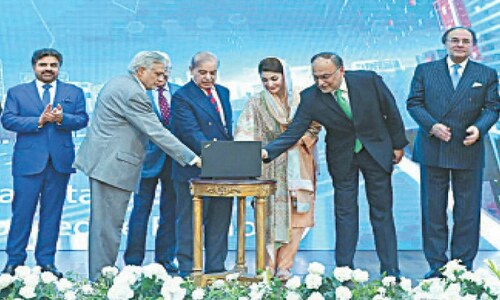ISLAMABAD: The High Power Selection Board (HPSB) headed by Prime Minister Imran Khan on Monday considered senior bureaucrats for the top grade in civil service but withheld announcement of its decisions.
“The Prime Minister Office did not communicate the outcome of the HPSB meeting to the Establishment Division,” a senior official told Dawn on Monday.
Sources in the Establishment Division said the HPSB meeting had been called by the division to seek the prime minister’s approval for promotion of BS-21 officers on the seniority list to BS-22 without even considering a recent judgement of the Supreme Court on the seniority of over 40 officers, of which about a dozen were eligible for promotion to grade-22.
The sources said Establishment Secretary Ejaz Munir and Cabinet Division Secretary Fazal Mekan had been informed before the HPSB meeting about the SC judgement, but they did not communicate it to the prime minister.
The matter was then brought into the knowledge of the advisers to the Prime Minister on Institutional Reforms and Austerity Dr Ishrat Hussain and on Establishment Division Shahzad Arbab who highlighted the SC order during the meeting.
The sources said that although the HPSB had made some recommendations and deferred the names of others in the seniority list, the PM Office had not communicated these names to the Establishment Division in writing.
On Oct 25, the Supreme Court had ordered restoration of the seniority of the officers who had been promoted to BS-21 in January after having been denied promotion over the past three years.
Some officers expecting elevation to BS-22 rose in seniority as their seniors were denied promotion. With the restoration of backdated seniority of such officers, their juniors expecting elevation to BS-22 may lose their prospects.
However, the seniority of powerful bureaucrats, including the principal secretary to the prime minister, may be affected if the SC order is implemented as inclusion of the officers whose seniority was restored by the apex court may reduce his seniority.
An official privy to the development said that Justice Maqbool Baqir, who headed the SC bench that accepted the petitions of the bureaucrats earlier denied promotions and restored their seniority, had proceeded to Karachi and could not authored the judgement.
The fact was well in the knowledge of the secretaries of establishment and cabinet divisions as some of the officers approached them and requested for postponement of the HPSB meeting till the receipt of the written order. However, they ignored the request and continued to proceed in accordance with the already set schedule.
Since 2007 when the Establishment Division had amended the promotion policy of 1982 and placed 15 marks for evaluation of civil servants for promotion at the discretion of promotion board members, the promotion controversies have flooded the Supreme Court and high courts, consuming considerable time of the judiciary and public offices seeking relief against misuse of the discretionary powers.
After years of controversies, the Islamabad High Court had in its June 8, 2016 verdict finally struck down the Establishment Division’s decision of giving discretionary power to the promotion board to give 15 marks to civil servants.
The apex court had upheld the IHC judgement on March 13 last year. It had directed the Establishment Division to reconsider officers’ promotion, deferment and supersession made on the basis of the discretionary powers in 2015 and make fresh evaluations in such cases on the basis of civil servants’ service dossiers, practically eliminating the role of 15 discretionary marks in the promotion process.
The actual law of promotion is contained in Section 7(1)(b)(ii) and Section 7(1)(c) of the Federal Public Service Commission (FPSC) Ordinance, 1977; Section 25(2) of the Civil Servants Act, 1973; and Rule 8-A of the Civil Servants (Appointment, Promotion and Transfer) Rules, 1973.
Section 7(1)(b)(ii) of the FPSC Ordinance empowers the FPSC to advise the president on policy for promotion to BS-18 and above, while Section 25(2) of the Civil Servants Act empowers the president to enact such promotion policy in the form of rules. The president has already enacted such promotion policy in the APT Rules.
Rule 8-A, added to the APT Rules in 1998, enumerates precisely only three criteria for determination of merit for promotions in grades BS-17 to BS-22, including required minimum length of service, score in mandatory trainings and score in a promotion-related departmental examination, thus eliminating any other criterion or 15-mark discretion. The deviation from this law and induction of 15-mark discretion led to the lengthy litigation process.
The Establishment Division did not notify the posts falling in BS-17 to BS-22 and mentioned in Rule 8-A for promotion-related departmental examination under Section 7(1)(C) of the FPSC Ordinance. It rather made a parallel promotion policy of its own through office memorandums inconsistent with Rule 8-A of the APT Rules.
The promotions to BS-22 are made under the Civil Servants (Promotion to the Post of Secretary BS-22 and Equivalent) Rules, 2010. These rules modified certain specified office memorandums, but did not supersede or modify the three qualifications for promotion to BS-22 prescribed by the president in Rule 8-A of the APT Rules.
Despite repeated attempts, Establishment Secretary Ejaz Munir could not be contacted for his comment on the matter.
A senior official of the Establishment Division said the minutes from the PM Office on the HPSB meeting were still awaited. He said the Establishment Division might notify the cases approved by the HPSB by Tuesday evening provided the PM Office communicated the minutes of the meeting to the division.
Published in Dawn, October 30th, 2018














































Dear visitor, the comments section is undergoing an overhaul and will return soon.